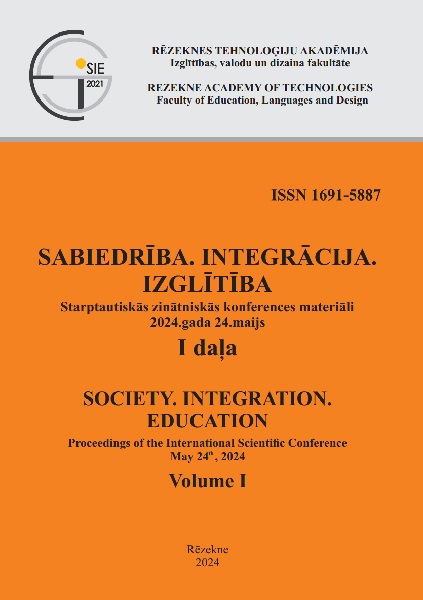TECHNOLOGIES FOR DEVELOPING THE CREATIVE POTENTIAL OF FUTURE VOCATIONAL TRAINING TEACHERS
DOI:
https://doi.org/10.17770/sie2024vol1.7907Keywords:
creativity, creative abilities, creative potential, educational technologies, personality, technologies, vocational training teacherAbstract
The article examines the important aspect of training future teachers of professional education, namely applying technologies to stimulate and develop their creative potential. The formation and development of the creative potential of an individual is of great importance in the context of the educational process and the formation of the future teacher, since modern society has set high demands on specialists regarding their professional qualities. Applying the technologies for developing student’s creativity is a key element of the modern educational process aimed at stimulating creative thinking and personal development of the future specialist. The article explores current challenges associated with preparing future professional education educators for the implementation of educational technologies that stimulate the unfolding of learners' creative potential. The materials of this study focus on the issue of technologizing the educational process in higher education institutions, which will contribute to its qualitative improvement, wider adoption of innovative approaches, modern development tools, teaching methods, and forms that will ensure the development of learners' creative abilities. The concept of pedagogical technology is examined, its essence and classification are revealed, and aspects of implementing a technological approach in the educational process of preparing future professional education educators are highlighted. The results of the experimental research presented in the article emphasize the importance of using modern pedagogical technologies and draw attention to the need to search for rational ways of teaching, develop modern principles, and justify the specifics of their implementation that meet the requirements for education aimed at shaping and developing the creative personality of the future professional. The article highlights the practical experience of implementing educational technologies in the institutions of higher education and defines the effective methods of evaluating and supporting the creative potential of students. The key aspects that contribute to the improvement of the professional development of future specialists and the creation of conditions for their creative self-expression in the educational process and the further professional activities were considered.
References
Antonova, O. (2015). Pedagogical technologies and their classification as a scientific problem. Modern technologies in education. P. 1. № 2. P. 8–15.
Baranovska, O., Kosianchuk, S., Trubachova, S., Chornous, O. (2018). Didactic context and peculiarities of implementing pedagogical technologies in the conditions of specialized education. Polish Science Journal, № 3. Р. 62–72.
Bloom, B. (1956). Taxonomy of educational objectives : The classification of educational goals. Handbook 1 : cognitive domain. New York. P. 187– 215.
Budnyk, O., Nikolaiesku, I. (2022). Digital technologies in the preparation of future educators: contemporary challenges of distance education. Viae Educationis: Studies of Education and Didactics. Vol. 1, № 2. P. 69–78.
Johnson, D. (2003). Social psychology: interpersonal communication training / Trans. from English by V. Homyk. К. 283 p.
Komensky, Ya.A. (1940). Great didactics: Selected pedagogical works. Т. 1. К. P. 136–137.
Kostyuk, H.S. (1989). Educational process and mental development of personality. Кyiv. 608 p.
Kovalchuk, V.I. (2017). Methodical recommendations for applying game technologies in the process of teaching the disciplines of the social and humanitarian cycle. Кyiv. 56 p.
Kovalchuk, V.I., Fedotenko, S.R. (2018). Innovative learning technologies as the basis of modernization of professional education. Young scientist. № 12. P. 425–429.
Kovalchuk, V., Iermak, Т. (2021). The development of communication skills of students of secondary school as a component of their leadership potential. Society. Integration. Education. Proceedings of the International Scientific Conference. Volume II. School Pedagogy. Preschool Pedagogy. May 28th-29th. Rezekne, Rezekne Academy of Technologies. Р. 292–303.
Kovalchuk, V., Marynchenko, I., Yashchuk, S. (2022). Creation of favorable educational environment in the higher education institutions of ukraine. Society. Integration. Education. Proceedings of the International Scientific Conference. Volume I. Higher Education. May 22th–23th. Р. 465–480.
Radchuk, H.K. (2014). Axiopsychology of the higher school: monograph. Ternopil’. 380 p.
Romakin, V.V. (2006). Computer data analysis: Tutorial. Mykolayiv. 144 p.
Torrance, E.P. (1974). The Torrance Test of Creative Thinking. Technical – norm manual. ІІІ. Р. 9–16.
Shevenko, A.M. (2016). Methodical support for the selection of students to higher educational institutions of the pedagogical profile: Method. recom. К. P. 98–106.
Sikorskyi, P.I. (2021). Major pedagogical approaches and their influence on the formation of educational technologies. Educational Horizons. Vol. 52. № 1. Р. 96–100.
Skinner, В.F. (1968). The Technology of Teaching. New York. 271 p.
Starosta, V. (2019). Interactive learning technologies: essence, classification. Scientific Bulletin of Volodymyr Sukhomlynskyi Mykolaiv National University. Pedagogical Sciences. № 1 (64). P. 232-237.
Vaskivska, H. (2018). Implementation of pedagogical technologies in the conditions of specialized education: an activity-based approach. Humanities Bulletin of Yuri Kondratyuk Poltava National Technical University. № 3. Р. 15–22.
Vovk, B.I., Matviyenko, D.Ye. (2020). Innovative pedagogical technologies as a means of improving the professional activity of teachers. Young scientist. № 10 (86). P. 376–381.
Yankovych, O., Bednarek, Yu., Andzheyevs’ka, A. (2015). Educational technologies of modern educational institutions: educational and methodical manual. Ternopil’. 212 p.






